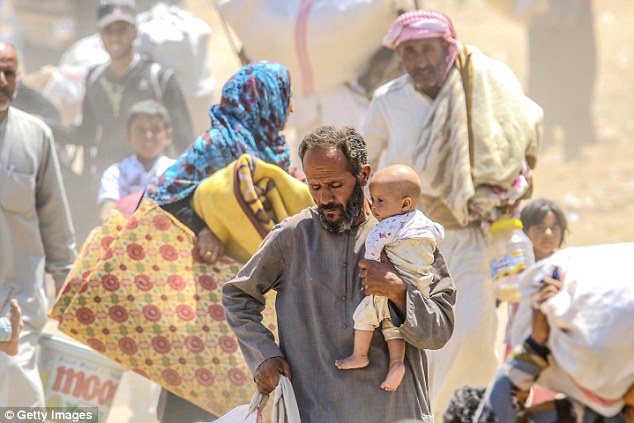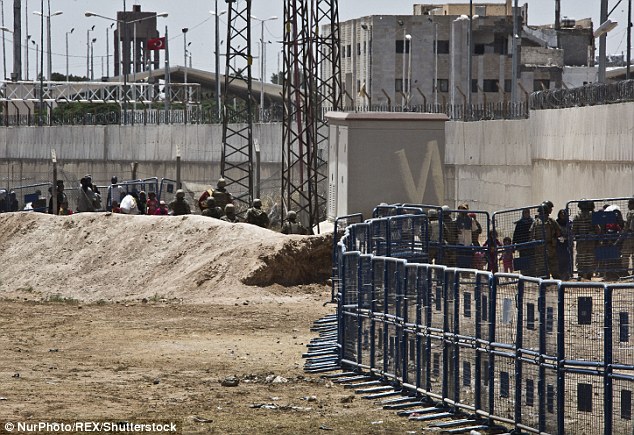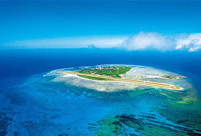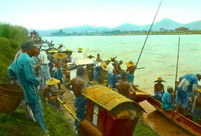

Arriving back in Raqqa, they were taken to a soccer stadium, known as Point 11: a notorious Isis prison and security centre.
A man arrived and addressed them. 'Brothers, do not say, 'I will not fight any more.' Just say, 'I prefer to fight in Syria.' You will be given one more chance.'
A few days later, Abu Ali found himself alone in a house in the town of Manbij, not far from the front. There was an internet cafe next door, and to his delight, he heard the chime of a WhatsApp message on his phone. He looked at it and his heart leapt: it was his wife.
She had written an old expression that they both liked: 'If you love something, let it go. If it doesn't come back, it wasn't meant for you. But if it does, it will be yours forever.'
Abu Ali found himself shaking with emotion. He apologised for his mistakes. He told her he wanted to come back.
Abu Ali said: 'The second I saw her first message I started hating them all. I said to myself: What have I done?'
He had heard a rumour that one of his comrades in the Iraq battle, a man from Morocco, had escaped to Turkey. He sent him a WhatsApp message.

Escape: Amid the chaos of the border town of Tal Abyad, where refugees fled into Turkey to escape the fighting, above, Abu Ali managed to make contact with a smuggling gang who spirited him to freedom

Syrian civilians leave the town of Tel Abyad seeking refuge in the Turkish border town of Akcakale, where Abu Ali first crossed into Syria and where he later escaped
The Moroccan wrote back quickly. He said: 'Go to Raqqa'. Equipped with a sick-leave document, Abu Ali got on a civilian bus early the next morning. He was wearing an Afghan-style cloak that identified him as a member of Isis, and no one gave him any trouble.
By the time he arrived in Tal Abyad it was 9pm, well past dark. He found an internet cafe and went inside to wait for the next message. As he looked around, it became clear that everyone in the cafe was Isis: long beards, AKs on the shoulders, Afghan robes.
Abu Ali felt himself shaking. He tried not to look at anyone, but one man was eyeing him suspiciously. The meeting time came and went. It was almost 11pm, and the cafe would soon be closing. He said to himself: that's it, I'm done for.
Finally, just before 11pm, two motorcycles pulled up just outside, and one of the riders shouted through the cafe door at Abu Ali: 'The food's ready, sorry we're late.' Abu Ali got up to go.
As he did so, the Isis man who had been staring at him in the cafe stepped forward. 'Where are you from?' he said.
Abu Ali replied in an Aleppo accent – he figured a local by himself was less suspicious than a foreigner: 'I'm sorry, I'm late, I have to go.'
He walked out the door and got on the back of one of the motorcycles, scarcely breathing. But the bike took off down the road and no one followed.
The next day, after a sleepless night in a nearby house, the men who had rescued him from the cafe accompanied him to a remote stretch on the border.
Abu Ali crawled through a hole in the border fence to freedom on the night of 25 May 2015, just over four months after he had entered Isis territory.
 |
 Beijing Style: ready for bare legs
Beijing Style: ready for bare legs Top 10 Asian beauties in 2016
Top 10 Asian beauties in 2016 Amazing scenery of Xisha Islands
Amazing scenery of Xisha Islands Enthusiasts perform Kung Fu at Wudang Mountain
Enthusiasts perform Kung Fu at Wudang Mountain Stunning photos of China's fighter jets in drill
Stunning photos of China's fighter jets in drill Old photos record the change of Sichuan over a century
Old photos record the change of Sichuan over a century Asia's longest and highest suspension bridge to open to traffic
Asia's longest and highest suspension bridge to open to traffic China's first interactive robot looks like a beauty
China's first interactive robot looks like a beauty Vietnamese Su-30 fighters fly over Nanwei Island in South China Sea
Vietnamese Su-30 fighters fly over Nanwei Island in South China Sea Top 20 hottest women in the world in 2014
Top 20 hottest women in the world in 2014 Top 10 hardest languages to learn
Top 10 hardest languages to learn 10 Chinese female stars with most beautiful faces
10 Chinese female stars with most beautiful faces China’s Top 10 Unique Bridges, Highways and Roads
China’s Top 10 Unique Bridges, Highways and Roads Affection for young actors takes root, who says you have to be a teen to be a fan?
Affection for young actors takes root, who says you have to be a teen to be a fan? High-end brands closing mainland stores as Chinese spend more overseas
High-end brands closing mainland stores as Chinese spend more overseas Private detectives cash in on China’s rampant marital infidelity
Private detectives cash in on China’s rampant marital infidelity HRW meddles ineptly in deportation case
HRW meddles ineptly in deportation caseDay|Week